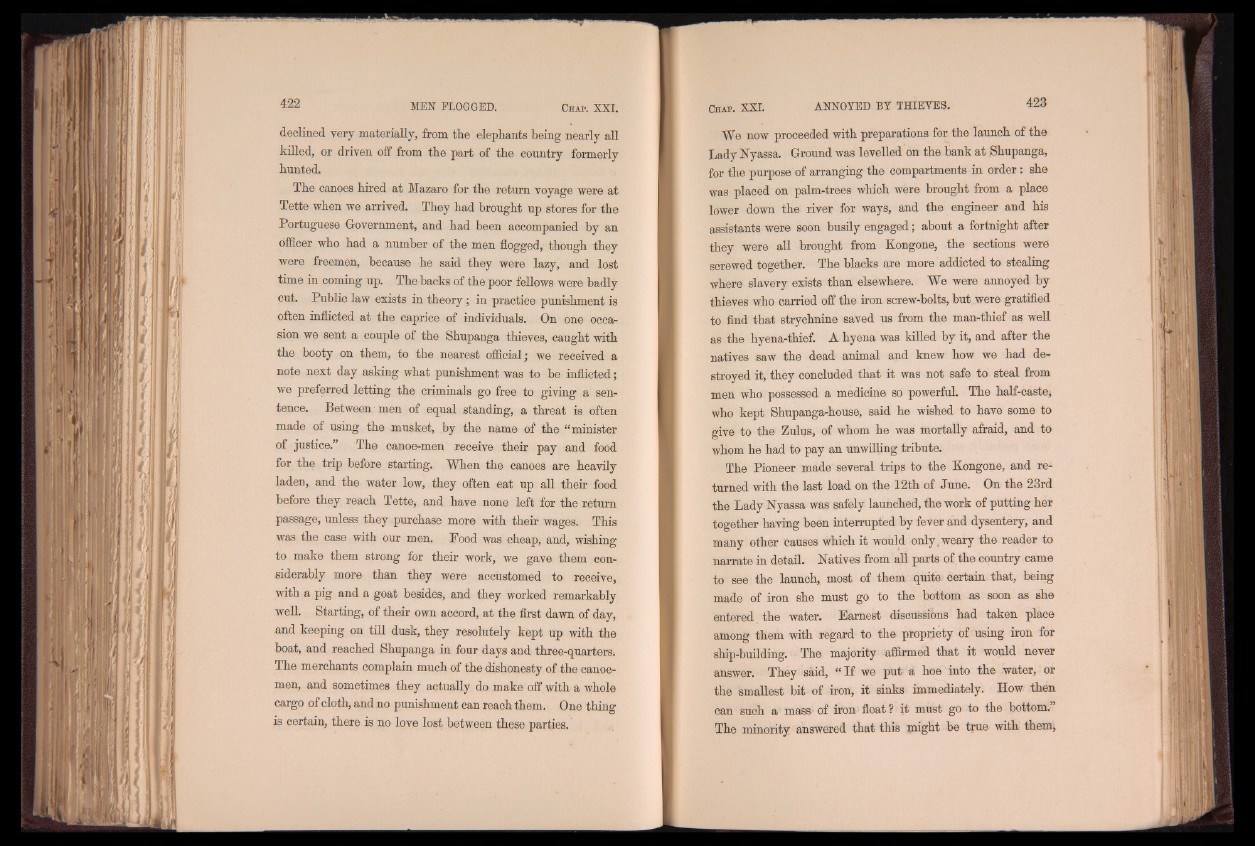
declined very materially, from the elephants being nearly all
hilled, or driven off from the part of the country formerly
hunted.
The canoes hired at Mazaro for the return voyage were at
Tette when we arrived. They had brought up stores for the
Portuguese Government, and had been accompanied by an
officer who had a number of the men flogged, though they
were freemen, because he said they were lazy, and lost
time in coming up. The backs of the poor fellows were badly
cut. Public law exists in theory; in practice punishment is
often inflicted at the caprice of individuals. On one occasion
we sent a couple of the Shupanga thieves, caught with
the booty on them, to the nearest official; we received a
note next day asking what punishment was to be inflicted;
we preferred letting the criminals go free to giving a sentence.
Between men of equal standing, a threat is often
made of using the musket, by the name of the “minister
of justice.” The canoe-men receive their pay and food
for the trip before starting. When the canoes are heavily
laden, and the water low, they often eat up all their food
before they reach Tette, and have none left for the return
passage, unless they purchase more with their wages. This
was the case with our men. Pood was cheap, and, wishing
to make them strong for their work, we gave them considerably
more than they were accustomed to receive,
with a pig and a goat besides, and they worked remarkably
well. Starting, of their own accord, at the first dawn of day,
and keeping on till dusk, they resolutely kept up with the
boat, and reached Shupanga in four days and three-quarters.
The merchants complain much of the dishonesty of the canoe-
men, and sometimes they actually do make off with a whole
cargo of cloth, and no punishment can reach them. One thing
is certain, there is no love lost between these parties.
We now proceeded with preparations for the launch of the
Lady Nyassa. Ground was levelled on the bank at Shupanga,
for the purpose of arranging the compartments in order: she
was placed on palm-trees which were brought from a place
lower down the river for ways, and the engineer and his
assistants were soon busily engaged; about a fortnight after
they were all brought from Kongone, the sections were
screwed together. The blacks are more addicted to stealing
where slavery exists than elsewhere. We were annoyed by
thieves who carried off the iron screw-bolts, but were gratified
to find that strychnine saved us from the man-thief as well
as the hyena-thief. A hyena was killed by it, and after the
natives saw the dead animal and knew how we had destroyed
it, they concluded that it was not safe to steal from
men who possessed a medicine so powerful. The half-caste,
who kept Shupanga-house, said he wished to have some to
give to the Zulus, of whom he was mortally afraid, and to
whom he had to pay an unwilling tribute.
The Pioneer made several trips to the Kongone, and returned
with the last load on the 12th of June. On the 23rd
the Lady Nyassa was safely launched, the work of putting her
together having been interrupted by fever and dysentery, and
many other Causes which it would only,weary the reader to
narrate in detail. Natives from all parts of the country came
to see the launch, most of them quite certain that, being
made of iron she must go to the bottom as soon as she
entered the water. Earnest discussions had taken place
among them with regard to the propriety of using iron for
ship-building. The majority affirmed that it would never
answer. They said, “ If we put a hoe into the water, or
the smallest bit of iron, it sinks immediately. How then
can such a mass of iron float? it must go to the bottom.
The minority answered that this might be true with them,